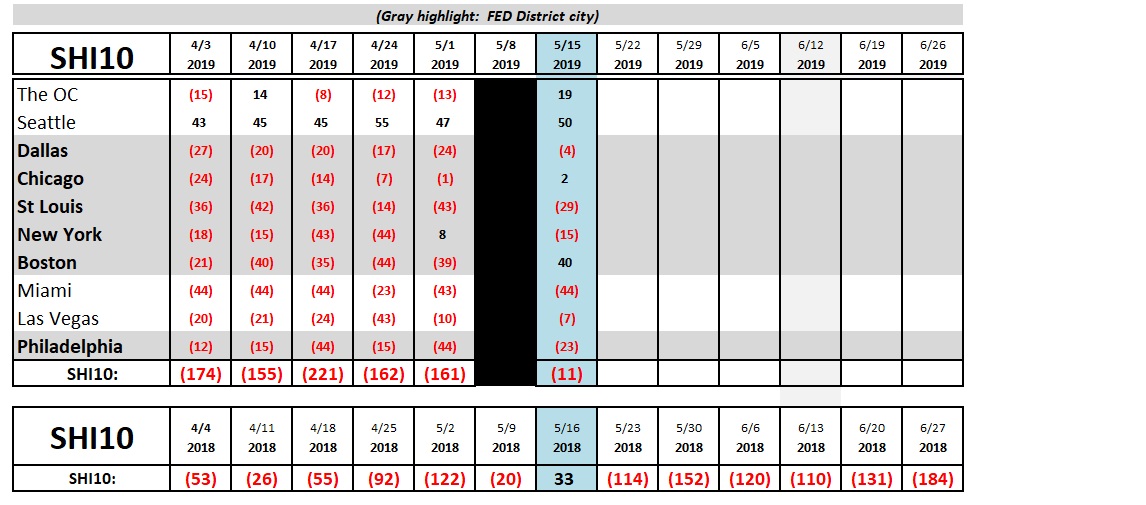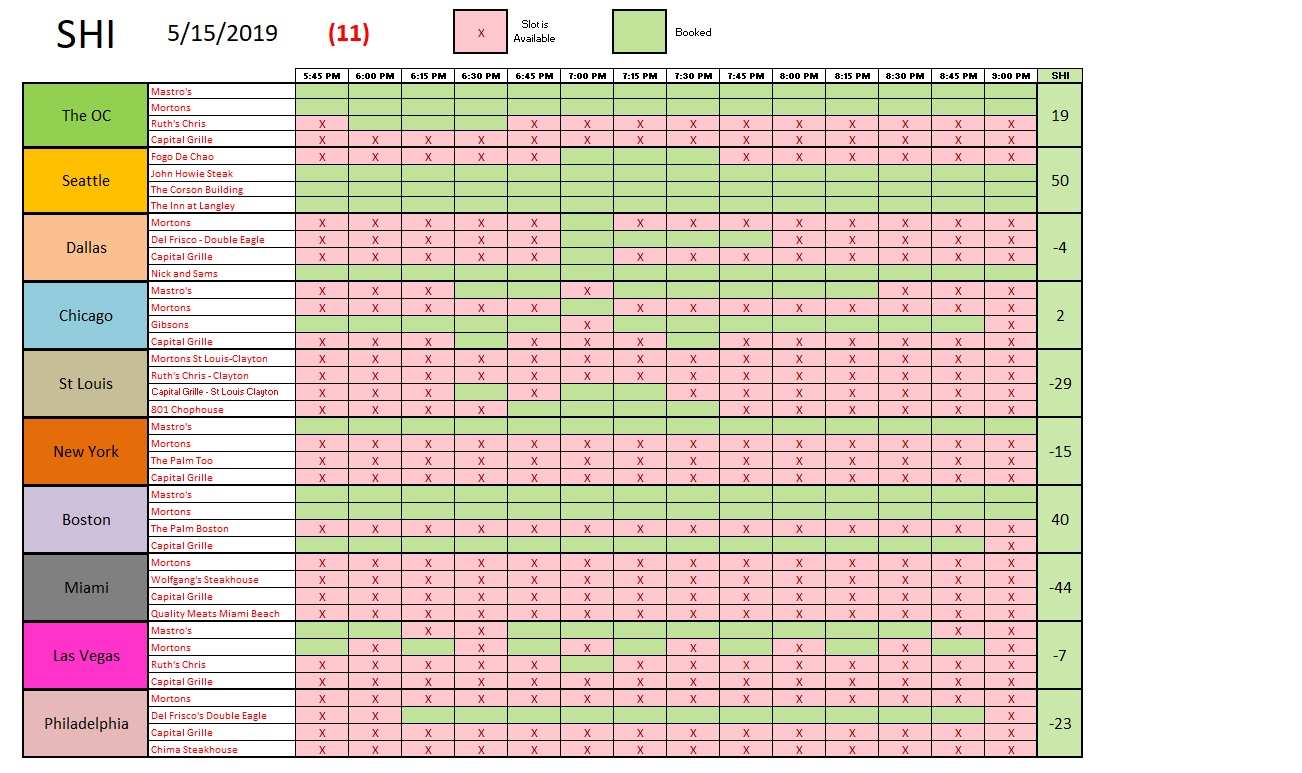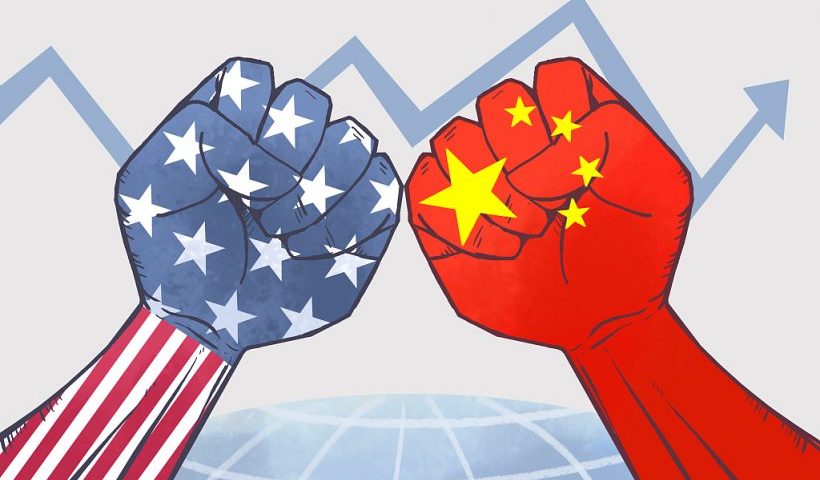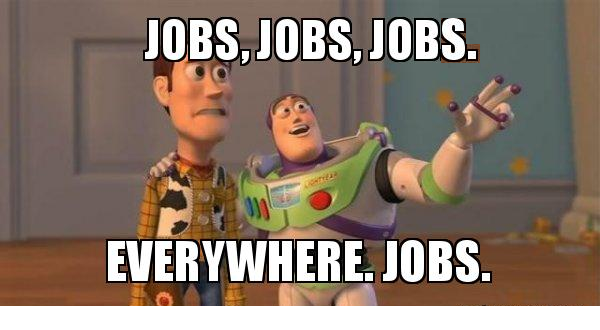SHI 5.15.19 – The Truth About This Trade Thing

SHI 5.8.19 – No Steak for You
May 8, 2019
SHI 5.22.19 – Trade, Tariffs and Inflation
May 22, 2019“The ‘China trade war’ is once again occupying the headlines. And the financial markets.”
Which concerns me greatly, as your watchdog of both expensive steaks and our US GDP; because, I’m concerned the resulting disruptions and fear may adversely impact our economy.
Steve Liesman, one of the lead commentators and a sharp economist on CNBC, is concerned as well. But for a slightly different reason: He is concerned we’re effectively heading to war with China. His strong opinion is that the China trade issue is:
“At best, poorly understood … at worst, purposely misstated.”
Perhaps both, Steve? Many people I speak with confuse the ‘US trade deficit’ with the ‘US spending deficit.’ These are very different problems. And the problem with the headlines and rhetoric is this: We have no idea what is “true” and what is “fake news.”
-
Does the US have a “trade problem” with China?
-
If yes, is the problem the trade deficit … or something else entirely?
-
If yes, why should we deal with this problem now?
Let’s take a closer look.
Welcome to this week’s Steak House Index update.
If you are new to my blog, or you need a refresher on the SHI10, or its objective and methodology, I suggest you open and read the original BLOG: https://www.steakhouseindex.com/move-over-big-mac-index-here-comes-the-steak-house-index/
Why You Should Care: The US economy and US dollar are the bedrock of the world’s economy. This has been the case for decades … and will be true for years to come.
But is the US economy expanding or contracting?
According to the IMF (the ‘International Monetary Fund’), the world’s annual GDP is about $80 trillion today. US ‘current dollar’ GDP now exceeds $21 trillion. In Q1 of 2019, nominal GDP grew by 3.8%…following a 4.1% increase in Q4, 2018. We remain about 25% of global GDP. Other than China — a distant second at around $12 trillion — the GDP of no other country is close. We can’t forget about the EU — collectively their GDP almost equals the U.S. So, together, the U.S., the EU and China generate about 2/3 of the globe’s economic output. Worth watching, right?
The objective of the SHI10 and this blog is simple: To predict US GDP movement ahead of official economic releases — an important objective since BEA (the ‘Bureau of Economic Analysis’) gross domestic product data is outdated the day it’s released. Historically, ‘personal consumption expenditures,’ or PCE, has been the largest component of US GDP growth — typically about 2/3 of all GDP growth. In fact, the majority of all GDP increases (or declines) usually results from (increases or decreases in) consumer spending. Consumer spending is clearly a critical financial metric. In all likelihood, the most important financial metric. The Steak House Index focuses right here … on the “consumer spending” metric. I intend the SHI10 is to be predictive, anticipating where the economy is going – not where it’s been.
Taking action: Keep up with this weekly BLOG update. Not only will we cover the SHI and SHI10, but we’ll explore related items of economic importance.
If the SHI10 index moves appreciably -– either showing massive improvement or significant declines –- indicating growing economic strength or a potential recession, we’ll discuss possible actions at that time.
The BLOG:
Let me make this simple: Yes, the US — and, in fact, every country in the G20 — has a serious problem with China. And the problem has grown worse over the past decade and a half. But no, the problem is not the trade deficit. That’s an entirely different issue. Here’s the real problem, the real meat of the matter:
China joined the World Trade Organization in 2001 — about 18 years ago. When they joined the WTO — an organization which today is 164 members strong — they agreed to comply with the same global trade regulations as every other member. Since day one, they have not.
If you’re feeling exceptionally frisky, and really want to run amok in the weeds, open the following link which will give you full access to a 183 page report from the US Trade Representative entitled, “2018 USTR Report to Congress on China’s WTO Compliance“.
If you’d like a simpler, more concise picture, read the excerpt below, taken from page 8 of the report:
“While China appeared to revise numerous laws and regulations to bring them into conformity with its WTO obligations in the first few years after its WTO accession, China’s trade regime nevertheless generated many WTO compliance concerns. Too often, WTO members have had to resort to the WTO’s dispute settlement mechanism to change problematic Chinese policies and practices. The United States, for example, has brought 23 challenges at the WTO against China covering a wide range of important policies and practices.”
Among other matters, these US challenges at the WTO have taken on the following WTO-inconsistent activities by China:
- local content requirements in the automobile sector;
- discriminatory taxes in the integrated circuit sector;
- hundreds of prohibited subsidies in a wide range of manufacturing sectors;
- inadequate intellectual property rights (IPR) enforcement in the copyright area;
- significant market access barriers in copyright-intensive industries;
- severe restrictions on foreign suppliers of financial information services;
- export restraints on numerous raw materials;
- a denial of market access for foreign suppliers of electronic payment services;
- repeated abusive use of trade remedies;
- excessive domestic support for key agricultural commodities;
- the opaque and protectionist administration of tariff-rate quotas for key agricultural commodities; and
- discriminatory regulations on technology licensing.”
The real meat, in my opinion, shows up on page 37 in the section called “Intellectural Property Rights” (IPR). Permit me a quote from the report:
“Serious inadequacies in the protection and enforcement of trade secrets in China have been the subject of high-profile attention and engagement between the United States and China in recent years. Thefts of trade secrets for the benefit of Chinese companies have occurred both within China and outside of China. Offenders in many cases continue to operate with impunity. Particularly troubling are reports that actors affiliated with the Chinese government and the Chinese military have infiltrated the computer systems of U.S. companies, stealing terabytes of data, including the companies’ intellectual property (IP), for the purpose of providing commercial advantages to Chinese enterprises.”
By any measure, this behavior is staggeringly bad. And it should have been dealt with before now. Better late than never?
Sometimes IPRs are lost not due to theft, but strong-arm tactics. Consider this statement, courtesy of a JPM Chase report on the same trade issues:
“China allows foreign automobile manufacturers to operate in China only through joint ventures with Chinese enterprises, and since none of these JVs can be majority foreign-owned, this requirement effectively requires foreign automobile manufacturers to transfer their core NEV technologies to their Chinese JV partners.”
Ouch. So, US companies are permitted access to the huge China market and consumer pool, but only at the expense of the loss of their trade secrets? I consider that price to be too high to pay. My opinion.
And according to the report, the problem is getting worse. The bottom line: If not now, when? This “war” — whatever shape or form it takes — will cause some short-term pain. But if we — the US and the rest of the world — don’t deal with this now, the problem will continue to grow until, perhaps, the war moves from trade, the WTO and the courts into the military, the battlefield and the cities of the US. Perhaps my forecast is hyperbolic and fear-mongering. I hope. But I fear a military conflict, a decade or two from now, is not out of the question. Unless this problem is resolved now.
The US trade deficit is an “issue” but it’s not THE problem. Last month, the US trade deficit, which in simple terms is the amount of stuff we import minus the amount of stuff we export, was about $50 billion. Which means annually is runs about $600 billion. The vast majority of this trade deficit is with China. (We also run a large trade deficit with Germany.)
Suppose we could flip a switch tomorrow and instantly shift ALL Chinese manufacturing to, say, Vietnam, Cambodia, India and Malaysia. Would that impact our trade deficit? Not one cent. We would still have a $600 billion trade deficit with the rest of the world, just no longer with China.
Which is why I say this is an “issue” but not the problem we have with China. The China “problem” is very different.
Early in the trade debate, this ‘trade deficit’ issue was portrayed as the problem — and that’s why Steve Liesman took issue with the confusing rhetoric. His opinion — and mine — is we need to focus on the real problem. And the real problem is China’s constant and continuous failure to obey WTO trade agreements, and their theft of US technology and trade secrets. That’s what the US needs to stop now. That’s what the US should have stopped dead in its tracks a decade ago. The USTR report is clear: We’ve tolerated China’s boorish behavior too long. We must stop them. Now. There’s the beef.
Did someone mention beef? OOOOoooooo goody. Let’s visit the steakhouses. This week I’m pleased to report the SHI10 shows significant improvement over the 5/1 numbers. Take a look:

For some reason, last year and now, this is a popular week to consume fabulously expensive cuts of beef. Reservation demand in the OC, Seattle, Chicago and Boston is quite robust. Miami? Not so much. Frankly, I think Miami — and perhaps the entire state of Florida — should go vegan. They should amend their state charter to prohibit expensive steak houses…no one wants to eat there! OK, perhaps I’m exaggerating a bit … but the numbers don’t lie! Every prohibitively pricey eatery we track, week after week, is wide open. You can secure a prime reservation slot in any restaurant you want. If I was a cow, I’d want to live in Florida. I would feel safe. Hmmm, on second thought, alligators do roam the countryside with impunity. This could be a problem. If you are a cow. 🙂
Here’s the weekly chart:

The OC saw significant improvement this week. Ruths’ Chris and Capital Grille both have plenty of openings … but you won’t be eating at Mastro’s or Mortons. Unless you are in Miami. There, you can get a reservation any time you wish. The 2018 SHI10 reading for this week was a positive 33. This week’s SHI10 reading is very close. The consumer seems to be spending. At least for pricey Filets’ and red wines.
Numerous times I’ve mentioned that economic expansions do not die of old age; they are usually killed by bad policy or some unexpected, exogenous event. This trade war could be that event. Time will tell.
But I agree that this is an economic battle the US needs to fight. And the time is now.
– Terry Liebman




